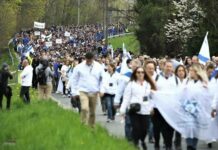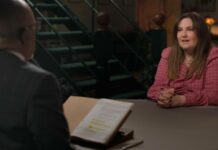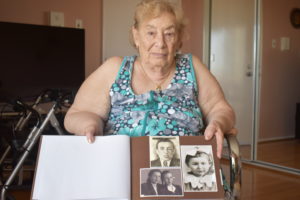
Though Yom HaShoah, Holocaust Remembrance Day, is an Israeli memorial day of the 6 million Jewish lives lost in the Holocaust, the day has become yet another opportunity for those in the United States to mourn the tragedies of the Holocaust.
Ukrainian Holocaust survivors and refugees are mourning doubly on this year’s Yom HaShoah, April 28: The holiday comes in tandem with continued Russian attacks on Ukraine under Russian President Vladimir Putin, who is not the first totalitarian ruler to make waves in Eastern Europe in the past hundred years.
But for families with recent memories of Soviet Union-era antisemitism under Joseph Stalin, embracing a Ukrainian identity in conjunction with a Jewish one, even in times of war, is proving difficult.
As Bronislava Kerzhnerman, an 83-year-old Holocaust refugee from Ukraine who lives in Philadelphia, lights a Yahrzeit candle every year to remember lives lost, memories of her family in the 1940s being sent to barracks in a town outside of Siberia mix with news from her cousin in Kharkiv who had to evacuate an apartment she had worked for years to afford.
“They don’t look if it’s an adult or a child; they just kill,” Kerzhnerman said about the similarities between Nazi and Soviet rule.
Kerzhnerman has only one photo from her childhood: a picture her neighbor kept because it made her appear to look less Jewish.
When Kerzhnerman and her family left for Siberia, they didn’t pack any additional clothing; Kerzhnerman’s mother thought the war would be short-lived. Her grandfather fled with her brothers, leaving Kerzhnerman’s mother to perform hard labor over an open fire.
When her mother was hospitalized with a severe burn injury, Kerzhnerman was sent to an orphanage, which she repeatedly ran away from, choosing to sit outside her mother’s hospital barrack and nibble on rationed bread.
At one point, Kerzhnerman’s mother, after she recovered, was sent to jail for allegedly speaking ill of Stalin.
“I came to the court, and a lawyer took me, and he said [to the judge], ‘This child does not have a father. Do you want her to not have a mother as well?’” Kerzhnerman said.
Her mother was later released from jail.
The family was able to resettle, and Kerzhnerman, who lived in Moscow with her husband for many years, came to the U.S. in 1987, seven years after her mother emigrated as part of the refuseniks.
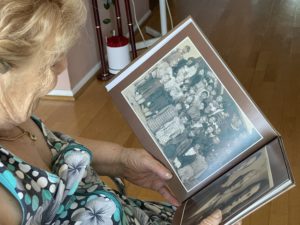
Even after World War II, healing for the victimized populations could not begin.
Lilia Miller, a KleinLife member born in Kharkiv, immigrated to the U.S. in 1997 after a lifetime of antisemitism that made her feel like her “dignity was being diminished.”
“The last month when [we] already knew that [we] were immigrating to the United States, someone wrote on [our] doors, ‘Get out of here,’ and a very derogatory term for Jews,” Miller said through an interpreter.
Miller and her family also endured the Holocaust. Her father was an officer in the military and left to serve in World War II, leaving Miller and her sister under the care of her mother and grandparents. The family had to pause their evacuation in Tashkent, Uzbekistan, after her sister got sick.
The family eventually fled to Kazakhstan, where they stayed until 1948, but when they returned to Kharkiv — after Miller’s father and grandfather died in the war from hunger — a non-Jewish family was living on their property. The family refused to give the home back.
But for many Ukrainian refugees, coming to America didn’t offer initial comfort, and assimilation to the new culture was difficult.
Kerzhnerman was a practicing dentist in Russia, but after immigrating to the U.S., her dental license was no longer valid. She had to return to dental school in New Jersey, but only had enough money to afford to become a hygienist.
Miller’s daughter had her pay her way through school by working as a dishwasher during the day and studying at night.
While Kerzhnerhman and Miller eventually came to feel at home in the U.S., time has not healed the wounds Ukraine has left on other refugees. Feeling protective of a Jewish identity has sometimes been at odds with embracing a Ukrainian identity.
Alla Gopshtein, a Doylestown-based 3G Philly member, immigrated to the U.S. more than 30 years ago from her hometown, Kyiv. Her grandparents who survived the Holocaust moved to the area a month later.
While Gopshtein will admit that her blonde hair and blue eyes protected her from some antisemitism in the Soviet Union, her father, with darker features, received the brunt of hatred against Jews.
“My dad, especially, and my mom — I don’t think the way they see it, Ukraine was good to them,” Gopshtein said. “If you ask them, they say they’re Jewish; they’re not Ukrainian.”
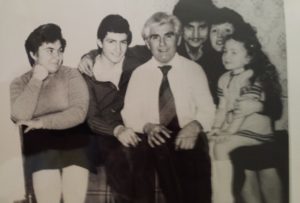
This sentiment is shared among other Ukrainian refugees, KleinLife President and CEO Andre Krug, who is from Kharkiv, noticed.
“I saw Jews who were still anti-Ukrainian, who still support Putin because they say their parents or grandparents were executed by Ukrainians during the Second World War,” Krug said.
COVID has yet again put a damper on KleinLife’s Yom HaShoah observance, which used to take place in person, but will continue virtually this year due to the many older and vulnerable individuals the organization serves.
This year, the implications of the war along with split political opinions among refugees, have made the timing of the day of remembrance particularly tense.
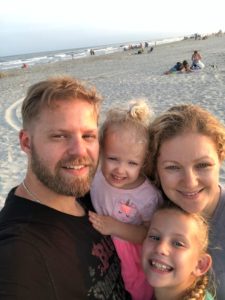
“People are just down,” Krug said.
Krug’s father is a Ukrainian Holocaust survivor, and he has had to grapple with his own reactions to the war in addition to providing support for fellow Ukrainians.
“I lost most of my relatives during the Second World War. Most of my family stayed in Ukraine, so basically, they were executed by Nazis,” Krug said. “It’s a story of many families from the former Soviet Union. Now, we have to watch in disbelief of what’s happening.”
Though sympathetic to fellow Ukrainians who are resentful of their home country, Krug believes differently. In times of political regression, as Krug describes it, the importance of moving forward, on both a global and individual level, is crucial to survival.
Krug tries to remember how Ukraine has tried to make amends for its past antisemitism. Electing and rallying behind Jewish Ukrainian President Volodymyr Zelenskyy was a way for the country to demonstrate this, Krug believes.
For peace of mind, Krug is hoping to move forward from Ukraine’s past antisemitic transgressions to stand in solidarity with Ukraine and maintain hope for the future. Jews have a unique perspective that allows for this, he said.
“If Jews would remember all the injustices that were adopted against them, we might as well call it quits,” Krug said. “Are we going to hold onto this type of vengeance? This type of, ‘How long are we going to remember this?’”
“For how long?” Krug continued. “Until we say, ‘You know what? We’re moving forward; we’re looking forward. We’re going to be better people for this.’”



